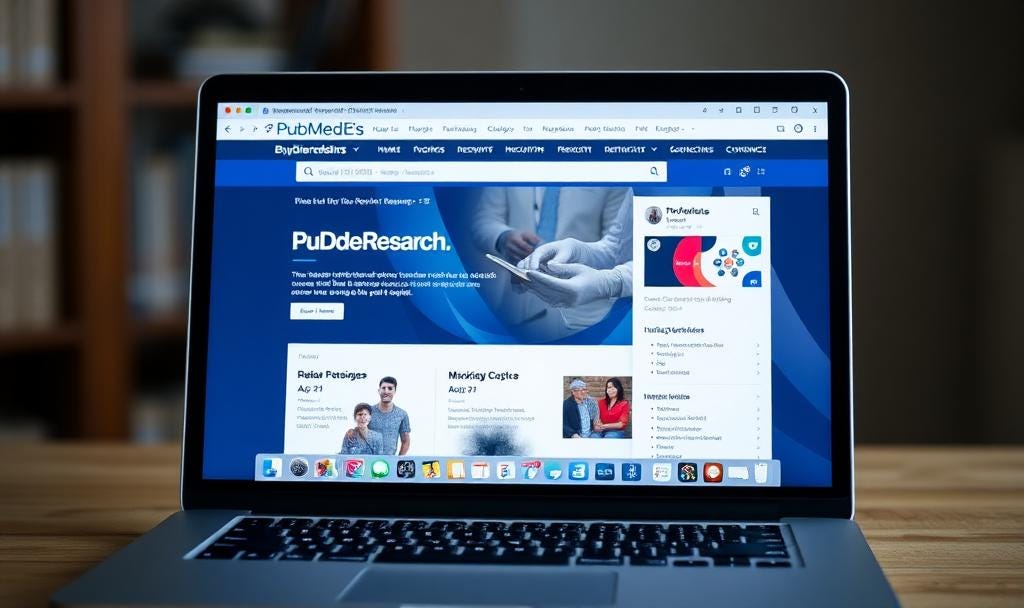How to Fix: "My Doctors Won't Listen to Me"
Getting the right diagnosis in a timely manner is more important than ever. Here are things we can do as patients to improve the chance of the best clinical care.
UPDATED: July 11th, 2025
Welcome to the Healthy Aging Newsletter, a free publication that turns trustworthy medical research into simple habits so adults in their 30s and 40s can stay healthy and avoid common chronic conditions.
Have you been dismissed by your doctor or feel that your symptoms have been downplayed? This can lead to missed diagnoses, wrong diagnoses, or losing trust in the medical system.
Step 1, what’s the problem?
Step 2, what could be the reason for these problems?
Step 3, what to do to prevent this problem.
Step 1 - The Actual Problem At Hand
The problem is that if your doctor doesn’t hear you out or you can’t fully express what’s going on with you then you won’t get a fair chance and uncovering a potentially harmful disease. This can lead to us missing something life threatening or intervening too late.
Miscommunication. Either the doctor can’t understand the patient or the patient can’t express themselves adequate. Commonly, a mismatch between doctor and patient is the source of the problem. Ever dated someone with whom you simply couldn’t communicate? Sometimes 2 people just can’t verbally connect.
Time. Some medical problems are really complex and need teasing out. Especially if what you’re experiencing is common among the general population, even if it’s uncommon for you. The most important predictor of success here is perseverance on the part of the patient and doctor to keep teasing out the issue without giving up. This requires dealing with frustrations and it requires time.
Empathy. If the doctor doesn’t care then no matter how hard the patient tries, they won’t listen or acknowledge the problem. Even worse, the doctor will intervene with a less effective test or treatment that will delay the diagnosis even more.
Knowledge. It’s rare to come across a doctor these days who doesn’t have good basic knowledge. But what matters most is to recall the necessary knowledge in that moment with the right patient.
Step 2 - The Root Cause of These Problems
In our modern, complex, grand-rapid healthcare, we need allies on our side. For those who’ve never built that long-term relationship with their primary care doctor who can advocate for them, getting fair, equitable care can be tricky.
It’s important to find a doctor with whom you can communicate well with. Do they listen? Do they seem to care? Are they comfortable saying no to you? Are you comfortable saying no to them?
You also need time. Not the 7-minute primary care appointment or the new 25-minute specialist appointments. If you are having a heart attack, that’s usually relatively easy. But if you’re developing ocular melanoma with nothing that a little pressure in your right eye, that’s going to require a lot of time to tease out.
Finally, it’s helpful to have insight into our body. When did this start? What makes it better or worse? Is it better with this or that? How does it change when you move this way? What have you tried? Are you feeling anything anywhere else? Some people can answer these questions in detail, while others are less in-tune with their body and so this line of questioning yields little.
Step 3 - How to Prevent The Problem
1. Have an Advocate
My wife goes with me to all my doctor appointments because she knows that I skimp over a lot of the important things. It’s not my intention, just that in the moment I don’t wanna be a bother to that doctor or feel the topic has been adequately addressed.
She’s not an agitator but is calm and persistent. If she just adds more fuel to the fire that wouldn’t be of use. Who is your advocate?
2. Practice Saying No
Saying no means “No, I don’t really feel reassured”, or “Sorry, I’m not convinced that’s the problem”, “I don’t want to just take this medication without knowing what else it could be.”
You can say firm no without being rude. Share how you feel and share why you aren’t convinced. If you are being dismissed that’s a problem.
3. Get Multiple Opinions
You don’t buy a house or car without testing out several options. Health has more consequences than a car selection, it requires several opinions. And 5 doctors should hopefully offer you 5 different opinions - that’s not a bad thing, that’s the art of medicine.
Sometimes all you need is 2 opinions. Unfortunately, sometimes it requires 5. The reason the last doctor is often the best choice is because you’ve now mastered the grammar and vocabulary of your condition and can communicate with your doctor properly and they know to listen.
4. Arm Yourself With Knowledge
Many times patient and doctor complete a visit and the patient never says what their biggest fear or worry is. “I’m worried this is cancer”, “I’m worried it’s a heart attack”. Knowledge is both internal reflection and external research.
If you’re afraid to bring up your Google search to your doctor it’s either because you are in the presence of a bad doctor or you don’t have the right advocate in the room with you.
5. Don’t Give Up
Even if there is a twinge of doubt, go back to your doctor or seek another opinion until you feel satisfied. Sure, there are many patients who’ll chase a diagnosis for 2-3 decades, sadly wasting their life away worried about a diagnosis that doesn’t exist. Refer to #4 above to know whether and when you’ve gathered enough information to make your best health decision.
6. Find The Right Doctor
Online, in-person, in the US, overseas, in-network, out-of-network, Google search, Yelp, or word-of-mouth - there are lots of ways to search for the right doctor with whom you can properly communicate.
But nothing beats having your own primary care doctor who knows you, knows how to advocate for you, can help you find the right second opinions, and can guide you through your health experience.
7. Don’t Blame the System
“This healthcare system sucks!” The problem with this statement is that it hinders you from getting the care you need and deserve. Even if it’s true, it serves you little value if your most important task is to find the right doctor in the right setting to get the right care.
My Final Thoughts
60% of health issues are quite straightforward - you either have or don’t have a diagnosis. The other 40% are quite nuanced and even the best doctors in the world with limitless resources may have a hard time getting to the right diagnosis in time. What we can do as patients is to help this process be much more efficient. Unfortunately, our healthcare system doesn’t have a user manual but many of us private practice primary care doctors have been patients in the same system and know how to advocate for our own patients.






